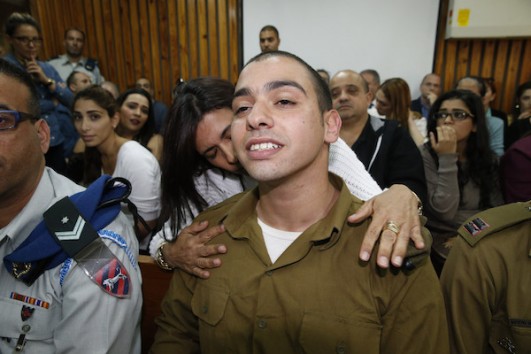When Sgt. Elor Azaria was caught on camera finishing off a wounded Palestinian knifeman and indicted for manslaughter, the IDF said rogue soldiers would always be brought to justice. The case of Bassem Abu Rahme, an unarmed protester who was fatally shot by an unknown soldier in 2009, shows that when given an opportunity to be lenient, the army will seize it.
By Yesh Din (written by Yossi Gurvitz)

On April 17th 2009, Bassem Abu Rahme was demonstrating against the separation wall in his West Bank village, Bil’in. After Israeli troops fired crowd-dispersal weapons and one demonstrator was hit, Abu Rahme shouted at the soldiers and Border Policemen that the person was wounded. Seconds later, a person in Israeli uniform (it is unclear whether he or she was an IDF soldier or a Border Police officer) fired a tear gas canister directly into Abu Rahme’s chest; the wound was fatal, and within hours Abu Rahme succumbed.
Until recently, these were uncontested facts. Even so, almost seven years after his death, no one has been held responsible for Abu Rahme’s death. Seven years of foot-dragging and investigation ducking (read more here and here.)
This is what happens when a member of the security forces shoots an unarmed man — who everyone agrees posed no danger — and the three cameras that documented the event are not aimed directly at the shooter.
We do not know who shot Abu Rahme and what unit he or she belonged to. We do, however, have forensic evidence pointing to where the shooter stood. The IDF carried out a ballistics examination that concluded that “the only possibility of this sort of armament hitting the target is only by direct fire and using a flat angle – no more than three or four degrees.” The examination effectively ruled out the possibility of Abu Rahme being hit by a canister shot according to the IDF’s regulations and hitting him by mistake; even if the canister ricocheted off a fence, it would still be fired directly, in defiance of the regulations.
In 2013, the head of the IDF’s Photo Reconnaissance Unit told the Military Police’s Criminal Investigations Division (MPCID) that direct fire of tear gas canisters is forbidden and that it should hold a lineup to determine where each of the shooters stood. The MPCID has yet to do so.
Last week, Israel’s Supreme Court heard an appeal by Yesh Din and human rights NGO B’Tselem, in which we demanded that the shooter be indicted, or at least that the army indict his commander. The hearing was held ex parte because the prosecution was striking. We suspect that the respondents would have argued that the shooters cannot be identified; what’s more, they would have probably played down the fact that for no less than 15 months, the MPCID and the military prosecution did their utmost to refrain from investigating the case, until being forced to in the wake of our first petition to the High Court of Justice. The government is likely to claim that the canister that hit Abu Rahme’s chest ricocheted off something – and will play down the fact that even if it did, its own ballistic diagnosis ruled that the firing was against the army’s own rules of engagement.
The government is further likely to argue that it has no clue as to whom it should prosecute, hoping the judges will not assign too much importance to the fact that it stifled the investigation for years. Our demand is simple: even if there is no chance to indict the shooters themselves, and we contend this claim since the MPCID’s failure to investigate rendered the case no longer investigable, the commanders should still bear responsibility.
So far, none of this has happened. The justices decided to rescind the petition, since, in the wake of the Turkel Commission report, a decision of the military prosecution can be appealed to the Attorney General – a provision that did not exist when we first submitted our appeal. Justice, it seems, will have to wait.
Unarmed, Abu Rahme posed a danger to no-one. It is important to emphasize this fact time and again. He was protesting an injustice in his village – an injustice recognized as such by the High Court of Justice itself. And yet, an Israeli security officer, perhaps more than one, fired at a demonstrator in a life-threatening manner and caused his death. We note that one of the suspects said in his interrogation that he never received proper training with the weapon he was using. The commanders of these warriors, who are responsible for their actions, continue to dodge their responsibility to this day.
Last month’s murder of a Palestinian by an Israeli soldier in Hebron, which was caught on camera, has been labeled exceptional, unrepresentative, and isolated by all. Every person of conscience should wonder whether this is so; whether the decisive statement in the case was not made of by Chief of Staff Gadi Eizenkot, but rather by Prime Minister Netanyahu, who phoned the shooter’s father and told him (Hebrew) to “trust the IDF investigation.”
What ought an Israeli security officer to understand from the prime minister’s remarks? A reasonable interpretation would be: “Don’t worry, our investigation will find you acted properly.” This, after all, is the unwritten contract between the government and its soldiers: We send you to do the dirty work of oppressing a civilian population, and in return we will turn a blind eye if you sometimes overstep the mark – unless you are caught red-handed, that is. Let the investigation charade begin.
Yesh Din is a volunteer organization working to defend the human rights of the Palestinian civilian population under Israeli occupation.
